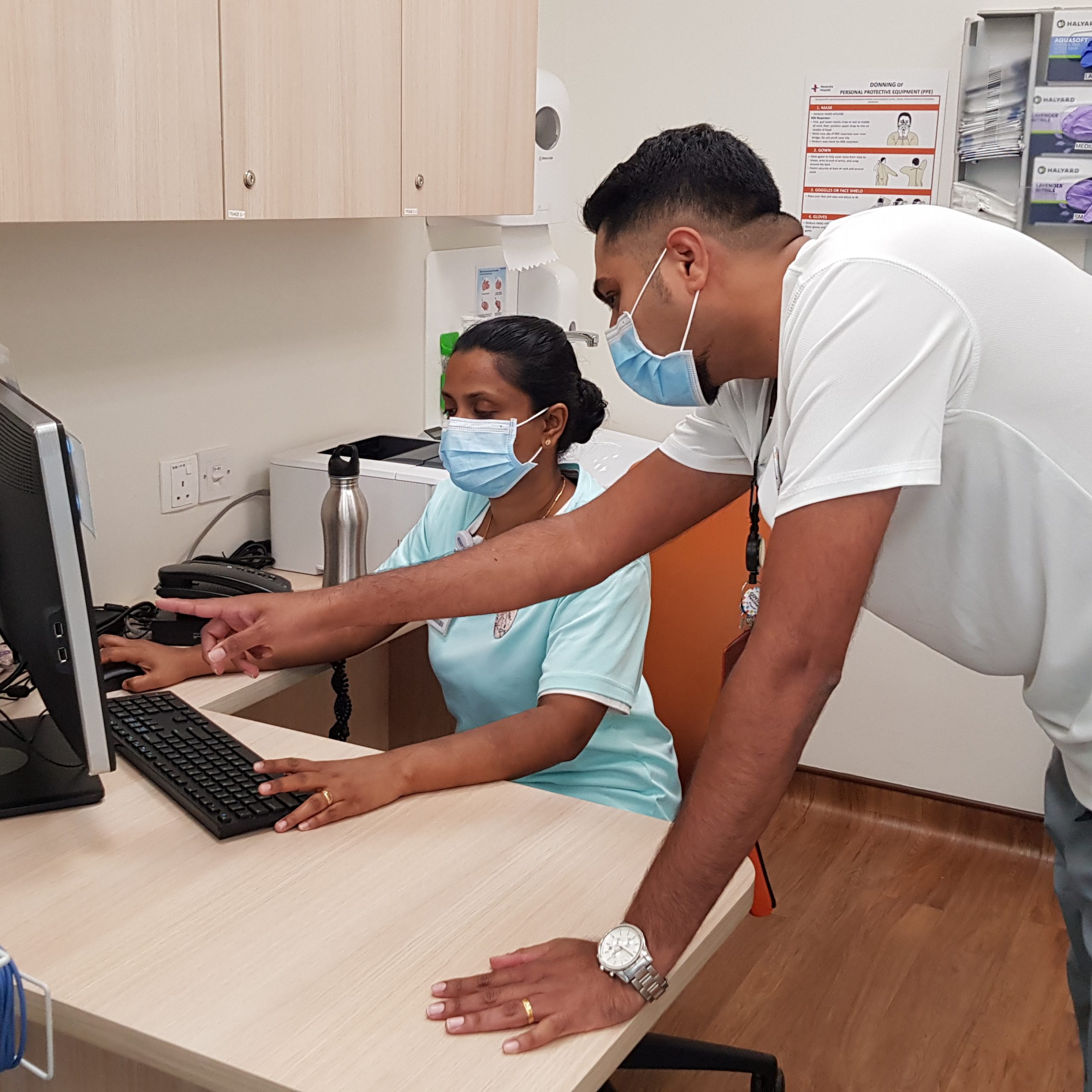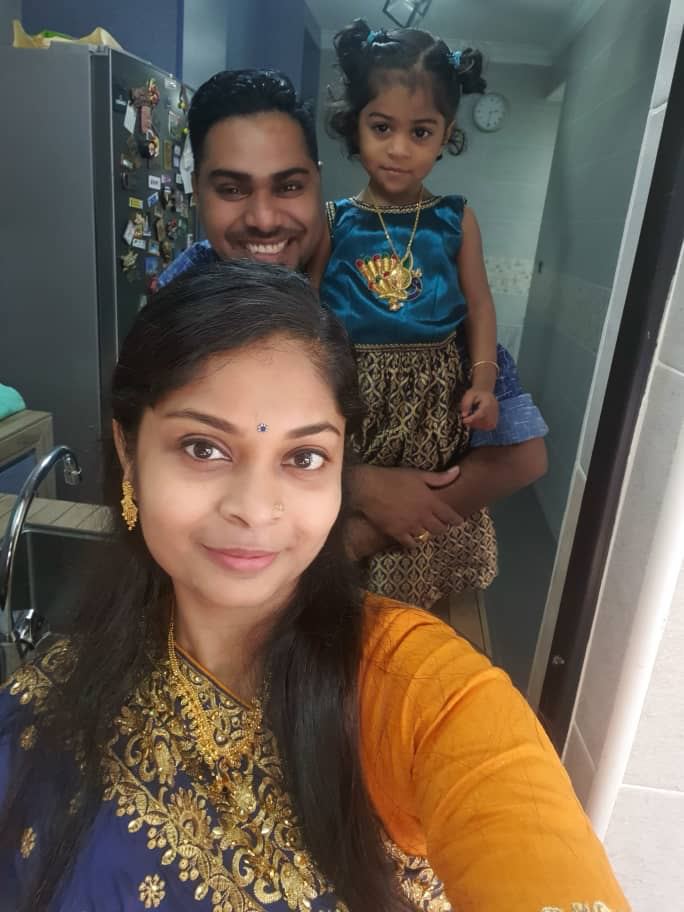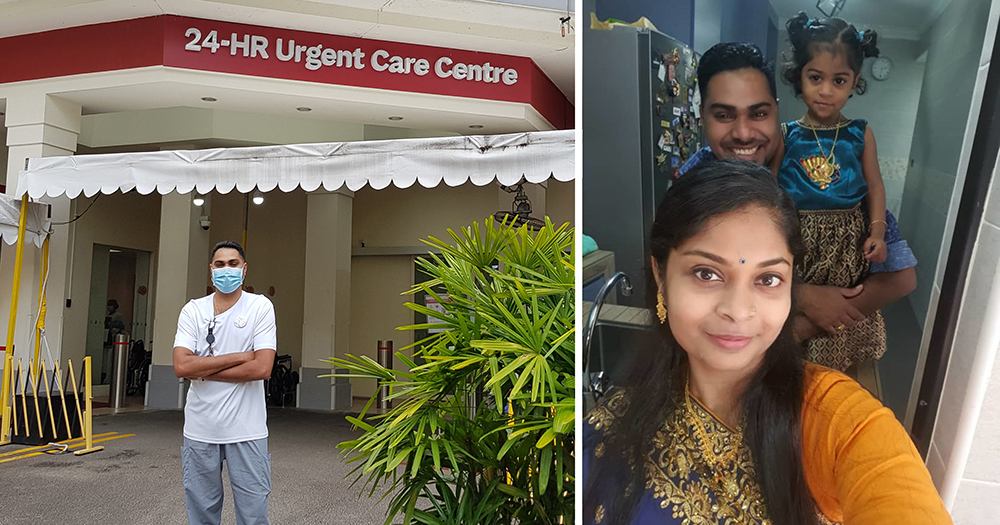PERSPECTIVE: Sanjeev Naidu Govindasamy has been an Emergency Room (ER) nurse for 13 years.
Currently, he is a Senior Staff Nurse at Alexandra Hospital’s Urgent Care Centre (UCC), and previously worked in NUH's ED from 2011 to 2018, before coming to Alexandra Hospital.
Sanjeev also shares about his most memorable cases in the Emergency Department (ED), the lessons he has learnt in dealing with situations such as conveying difficult news, the issue of long waiting times, and how he has been blessed in his marriage with his wife who is also working as an ER nurse in Malaysia.
Sanjeev's reflections on being an ER nurse first appeared in the book 'Missy Reflections: Reflections of Loss, Courage and Hope', published by Alexandra Hospital. You find out more here.
By Sanjeev Naidu Govindasamy, as told to Matthias Ang
I'm an adrenaline junkie
I wanted to be in emergency nursing because I'm an adrenaline junkie and the emergency room is a very high-intensity environment. That is the number one factor.
You never know what kind of patient is going to come through the emergency door.
But whoever comes, whatever comes, you have to be 100 per cent prepared and focused, and make split decisions in a very short period of time, delivering the utmost care to the patients.
So I chose Emergency Nursing. From the day I graduated in 2010, even from my third year of nursing in 2009, I have been attached to the ED and from then until today, I have been a full-fledged emergency nurse.
There has been no turning back.
The moment I knew nursing was for me
Nursing is actually my second career. I was previously a full-fledged mechanical engineer for seven years. However, I felt kind of bored by the 8 to 5 job.
I decided to apply for nursing school at the age of 27. I told myself, I would take one year to try it out.
Within the first four months, I had one incident that happened to me during my training period.
I was nursing a bedridden 21-year-old boy with an autoimmune disorder. My job as a trainee nurse was to bathe him and provide for all of his basic daily needs every day for three months.
Eventually, he was able to use a wheelchair and walk using the walking frame. When the father of the patient saw that, he immediately came to hug me.
That night, after so long, I really slept peacefully.
It was then that I knew, this is what I wanted to do.
I work three different shifts as an ER nurse
Currently, I have spent 13 years in ER. Three years in Malaysia and 10 in Singapore.
Emergency nurses work three shifts, morning, afternoon and at night, on a rotational basis.
In Alexandra Hospital, the morning shift begins at 8am. The earliest we can finish would be 3pm, while the latest is 5pm. For the afternoon, the earliest we start is 12pm and we will end by 9pm.
As for the night shift, we work 12 hours, from 8.30pm to 8.30am.
 Photo courtesy of Sanjeev Naidu Govindasamy
Photo courtesy of Sanjeev Naidu Govindasamy
Usually, there is a spike in cases within the ED after holidays
There is not much difference between the type of cases we get for our shifts. However, we can predict the types of patients we will receive on a quarterly basis or in the advent of public and school holidays.
For example, if Friday is a long weekend, we can anticipate that Monday morning will be a very busy morning in ED.
People who have developed some injuries or a condition could have waited until they have finished their staycation or long holiday before coming in on Monday.
For school holidays, before the Covid-19 pandemic hit, we did not have many cases of students or young adults coming into during the holiday itself because they will be out of Singapore, on vacation.
However, once the school holidays have finished and they are back in Singapore, it will be a busy period for us.
You can also see a dip in the number of elderly patients during the Hungry Ghost Festival. There won't be many elderly patients coming into hospital, out of superstition. They prefer not to come, unless they are really, really sick.
Now, apart from our fair share of normal surgical cases, there is an increase in patients with respiratory-related illnesses, such as elderly patients who have either been self-medicating or going to see a GP for cough, fever and a runny nose.
There has also been a rise in patients with anxiety attacks.
The most memorable cases that I have worked on
The passing of a three-day old baby which reminded me of my own daughter
One case that is very close to my heart is also a very sad one.
It happened in February this year. I had been posted to Ng Teng Fong Hospital for a one-month attachment. I still remember it was the third day of my posting in the hospital's ED — I was attached to a nurse in the Critical Area.
It was about 9:30am to 10am. We just took over from the night shift and were doing our daily equipment checks. All of a sudden, we heard a cry. Another nurse from the Triage Area, carrying a three-day old baby, ran to the Critical Area.
The baby suffered a cardiac arrest and had no heartbeat.
We tried to resuscitate the baby for one hour but the baby eventually passed on.
The resuscitation took place in front of the parents as they really wanted to be there for the baby. The consultants in ED also allowed it.
It was a very traumatic experience for both the parents and for us.
When we stopped the resuscitation, we said to the parents, "We're sorry." That's the only word used for such situations.
The parents broke down. The entire resuscitation team, three nurses and two doctors, was also emotionally affected. This took a toll as it was the beginning of our shift.
We had to prepare the baby to be handed over to the mother, to allow the parents to grieve. And at that moment, I was the only one who could swaddle the baby as I just had a baby girl two years back.
I've been separated from my daughter during this pandemic. I only got to see her for a few weeks during a short break in October last year, during Deepavali.
I've been keeping in contact by video call and WhatsApp. So I was very affected by this incident knowing that if anything happens in Johor Bahru, I won't be there for my own child.
 Source: Photo courtesy of Sanjeev Naidu Govindasamy
Source: Photo courtesy of Sanjeev Naidu Govindasamy
The thing is, once we settled everything with this baby in an hour, we are back on our feet again, to do our job for other patients. Support was also given by the nurse managers of Ng Teng Fong Hospital to help us overcome it.
We can't say, "I'm done, I can't take it, I have to go back home, I'm too emotionally affected."
No, we reflect, we hold up and we move on. And we make sure that episode does not affect us for the next six to seven hours of our shift.
Receiving 'help' from a 'frequent' patient in handling another patient
Some patients are 'frequent'. This means the same patient can come in two or three times a week, for a period of four to five months. They will show up every week with the same problem: intoxication.
I have even seen patients coming in frequently for a period of up to two years. We know their stories and they know us very well.
For example, some of them have greeted me with a shout from afar, "Hi Sanjeev, I'm back again!"
There was one incident where I was caring for two intoxicated patients in NUH. One was a patient that I knew very well, for many years. He always came in for the same problem.
The other patient was in NUH for the first time. He was found lying on a playground floor and a Good Samaritan had called the ambulance to send him to a hospital.
As the new patient became more sober, he became a bit aggressive, wondering why he was in the hospital. He also stood up and shouted a bit, even though he was still very dizzy and unsteady.
When we were trying to calm him down, the other patient whom I knew very well suddenly took off his blanket, got up from the bed and told the new patient, "Look here. You're in NUH, this is my nurse, you better be polite to him."
He even said, "I will protect them, you tell me who is being difficult."
And I had to tell the other patient, "No no no, please calm down."
Patients have chipped in to help ER nurses with other patients as well
Apart from helping with difficult cases, we also have patients who help to console worried patients beside them.
In fact, we have also learned a lot from our patients in ED about how loving people can be when they are sick.
I have seen patients who have a terminal condition, with months or even days to live.
But when they arrive in ED, they are so lively, cheerful and joyful. They will encourage us nurses to not be sad as we will be seeing them frequently in the department. Some of the patients become part of our ED family.
And sometimes, when there are language barriers with some patients, another patient will somehow realise we are having difficulties, open the curtain and ask, "Do you need help? I can translate for you."
It's really a team effort from the top to the bottom, from the doctors to the nurses, to auxiliary support staff, housekeeping, our patients and even their next-of-kin.
Communicating difficult news to patients
When it comes to communicating bad news or news of a patient passing on, we normally never do it alone.
We always go as a pair, as a doctor and a nurse, because you will never know how patients will react when they receive the news.
Emergency Departments will also have this special room known as the family room or quiet room.
We will gather the family in this room and once we enter the room, we have to do a very quick assessment of the emotions in the room. Some will be very calm, some will be very anxious, some will already be tearing up.
So we have to assess these situation very quickly and choose the right words and most importantly, right body language on how to convey the news.
To be honest, every single time, it gets harder and harder. There is not once where it has been easy.
You cannot just go in and say, "I'm sorry ma'am, I'm sorry sir, they have passed on" and just walk out.
The patient might be somebody's brother, sister, grandfather, grandmother, uncle, aunty, husband, wife...it's very tough.
You must know how to be a good listener
Sometimes, when we are just going to update a patient's next-of-kin or a caregiver, saying that "your father will be admitted into hospital and will take about one to two hours to get a bed," that short period of five to 10 minutes can become a longer conversation when they break down in front of you.
They will open up to you, say that they can't take the stress, and that they're worried about their parents.
And you just can't say, "Sorry, I can't..."
No, you still have to stand there, hold them, listen to them and reassure them that you will do your best to help their parents.
Small things like offering them a seat or a beverage can be seen as a huge gesture as well.
I am fortunate that my wife is also an ER nurse
I got married in 2013. My wife is also an ER nurse. So she understands what goes on in the emergency room and we can communicate about it.
She also understands, why I have missed the first and second birthdays of my daughter as a result of the border closure.
Until today, people find it hard to believe our story, but we met through an arranged marriage.
My parents were pushing for me to get married and I was not in a relationship then.
So I told my father, "You want me to get married? Fine, I give the responsibility to you. Find me a girl who understands my job. I'm a nurse, I work shift hours, I will not be able to get long periods of leave, I will never get weekends. Anniversaries and birthdays, very difficult to get leave."
Somehow it fell in place.
We are always trying our best
The public often complains that they wait for two, three even four hours in the waiting area before they are actually seen and treated.
But what I would like them to know is that within all of the ERs in Singapore's restructured hospitals, behind the curtain, patients are being resuscitated, they are on stretchers with their lives hanging by a thread. It is a chaotic and tense situation.
However, we are trying our best to accommodate patients as fast as we can, as soon as possible. We do want to cut down the waiting time. It is one of our highest targets in the pipeline.
All we want is understanding and an opportunity to explain why the waiting time is long. We really don't want our patients to wait in the hospital for a long time.
Remember, it's better to wait than to be the person on a stretcher.
Top images courtesy of Sanjeev Naidu Govindasamy
If you like what you read, follow us on Facebook, Instagram, Twitter and Telegram to get the latest updates.
